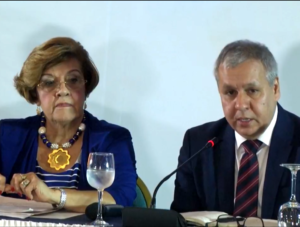Foto: ICBF
“The Convention is a moral universal instrument against injustice to which girls and boys in the world were subjected”
November 7, 2019
Por: Fabíola Munhoz
This statemet was highligted by the president of the UN Committee that monitors the Convention, during the 22nd Pan-American Child and Adolescent Congress
Close to the 30th anniversary of the Convention on the Rights of the Child (CRC) to be celebrated on November 20, the president of the Committee on the Rights of the Child, which is responsible for monitoring this treaty, Luis Ernesto Pedernera; and the rapporteur on the rights of the child and president of the Inter-American Commission on Human Rights (CIDH), Esmeralda Arosemena de Troitiño, presented some thoughts on the advances and challenges for the implementation of the Convention.
The panel took place at the closure of the 22nd Pan-American Child and Adolescent Congress, in Cartagena de las Indias, Colombia. This is one of the three organs of the The Inter-American Children’s Institute (IIN) [of the Organization of American States (OAS)], along to the Directing Council and the Directorate General. This forum has the purpose of promoting the exchange of experiences and knowledge among Inter-American System member States, in what refers to the rights of children and adolescents. In that sense, it is a forum to share commitments, advances, challenges and policies from States on this subject.

In his speech at the event, Pedernera stressed the value of the UN Convention on the Rights of the Child (CRC) as a universal treaty to protect human rights, ratified by 196 States and highlighted that its content must be made flesh in concrete life towards the realization of the rights of children and adolescents in the region.
He took the opportunity to call the United States to finally ratify the Convention, since this is the only country of the Organization of American States (OAS) that sill has not signed the treaty. “Since I know there are representatives from the United States here, I allow myself to remind them the call we made to this country to ratify the treaty, what will result in turning the Convention the first universal instrument of protection of human rights”, he emphasized, being greeted with applauses.
Pedernera also reminded how important it is that the States from the region sign the three optional protocols to the Convention, on the subjects of children and adolescents participation in armed conflict; addressing children and adolescent trafficking and protitution; and the possibility that individuals or groups file petitions and denounce States in cases of violation of rights. From OAS, 12 Latin America and Caribbean States signed the latter protocol.
Equally, he underlined it is necessary that States that already signed the Convention and its protocols respond to their responsibility of presenting reports on their accomplishment at the scheduled time, asking the UN High Commissioner for Human Rights for technical advice if needed. “The quality of the reports, unfortunately, has been poor”, said the president.
In turn, he also exemplified the importance of the third optional protocol, allowing the individual and collective presentation of complaints against States in cases of violation, commenting that 16 children, among them the Sweden student and activist Greta Thunberg, presented the complaint that the right to live in a healthy environment is being violated to the Committee on the Rights of the Child (CRC) in the occasion of the last UN General Assembly.
He recommended that States meet their financial commitments towards the UN, since the system is currently lacking resources, what threatens multilateralism and the protection of human rights at the international level. “There is an economic crisis at the United Nations affecting its operations. The last session of the Committee on the Rights of the Child was hardly held due to a lack of resources”, he regretted.
Civil society possibilities of participation
Pedernera also called civil society to organize and urge States for the realization of the rights of the child in face of the following processes:
- Convention on the Rights of the Child is preparing a new general comment on the digital rights of children and adolescents. This is at the stage of consultation to the States on this subject and the Committee is open to receive civil society recommendations and contributions;
- In September 2020, Convention on the Rights of the Child will make a general debate on the rights of children and adolescents to having a family life;
- In view of the anniversary of the Convention on the Rights of the Child, Convention on the Rights of the Child called the signing States of this treaty to present clear commitments and renewed promises for its accomplishment until November 20. From OAS, until now only Chile, Ecuador and Canada responded. In such a context, the president called civil society to urge governments to respond to this call and publicly announce their commitments to the realization of the Convention and the guaranttee of the rights of children and adolescents.
For children and adolescents participation
In turn, the president of IACHR highlighted that students, girls, boys and adolescents (NNA, for their acronyn in Spanish) must be recognized as rights holders and that it is urgent to secure comprehensive systems of protection of children and adolescents, addressing a range of issues from prevention of violations to providing special attention to certain groups in situation of vulnerability, coordinating different levels of government, including all localities.
She also pointed out the necessity of bigger investments on the rights of the child, in order to bring resources to those who need them more and that policies should address inequalities, violence, discrimination, exclusion, criminalization, the lack of safety and the repression against NNA, in regards to their conditions of disability, cultural diversity, gender, race, ethnic group etc. “The condition of migration is today a circunstance leading to multiple rights violations for girls, boys and adolescents who leave their homes”, she exemplified.
“Girls, boys and adolescents are rights holders and they should enjoy these rights by themselves, in order to develop their progressive autonomy to demand and exercize their rights and duties”
In that sense, she mentioned IACHR is developing a transnational mechanism to address the protection of the rights of migrants and reaffirmed the Commissions commitment of acting against repression and criminalization of students and NNA who are organized to defend their rights.
In addition she reminded the importance of the CRC and the Pan-American congresses to drive NNA protection and guaranttee. “Girls, boys and adolescents are rights holders and they should enjoy these rights by themselves, in order to develop their progressive autonomy to demand and exercize their rights and duties”, she explained.
In that sense she also stressed the need of a greater commitment from States to move from the Convention text to its practice and that besides rights protection systems, mechanisms of exigibility and justiciability of such rights must be secured to NNA. “We must search for, in our actions and policies for children and adolescents, their comprehensive development in the different spheres of human life, what includes their right to participate and to be seen as subjects with a constructive citizenship, prepared to intervene in public policies and communities. Citizenship construction starts in childhood”.
She added that we must advance towards the complete elimination of the autorization to NNA corporal punishment in some countries and that States must respond the call from adolescents and youths to guaranttee their sexual and reproductive rights and for comprehensive sexuality education that allows them to have a healthy and responsible development of their sexuality.
She also affirmed that in no circumstance human rights setbacks should be permitted. “This includes neither reducing the minimum age of criminal responsibility for adolescents, nor the investment of financial resources on the rights of children and adolescents”.
Check out the recording of this panel (in Spanish):
https://www.facebook.com/ICBFColombia/videos/1381307245355302/
Related Content





